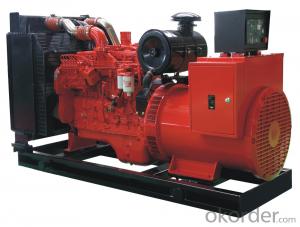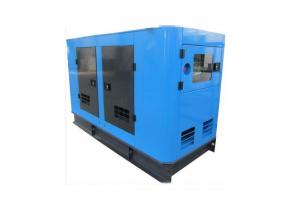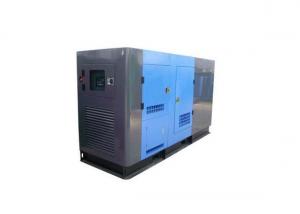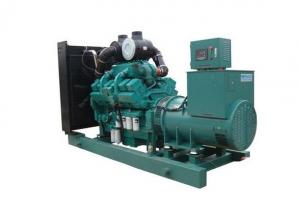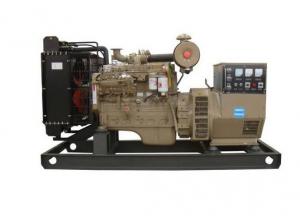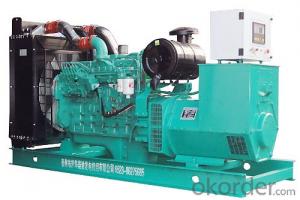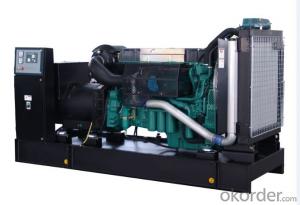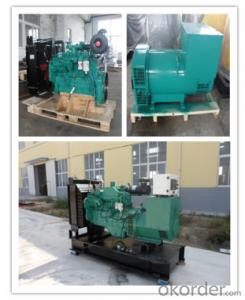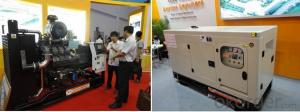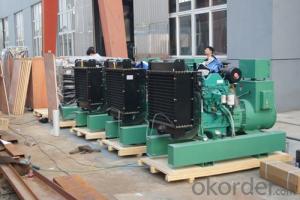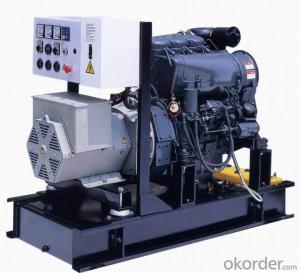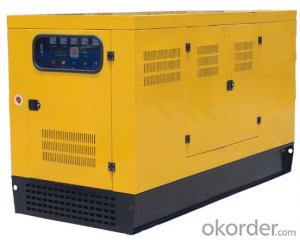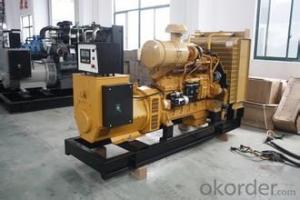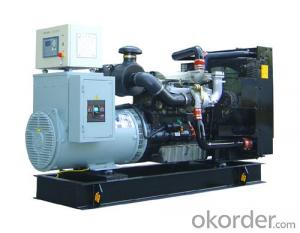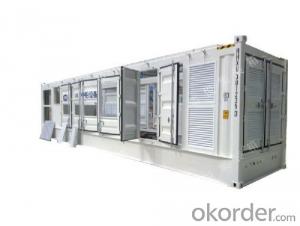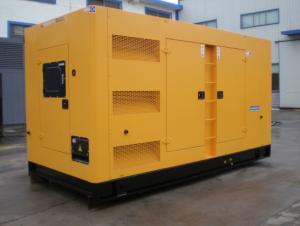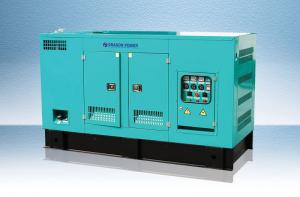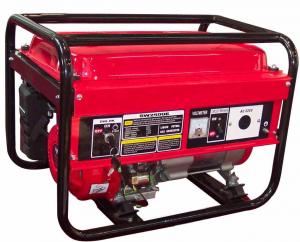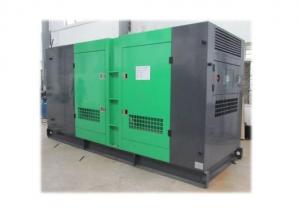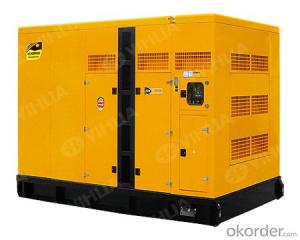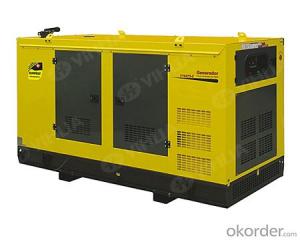Factory price china yuchai diesel generator sets 330kw
- Loading Port:
- Shanghai
- Payment Terms:
- TT OR LC
- Min Order Qty:
- 1 unit
- Supply Capability:
- 300 unit/month
OKorder Service Pledge
OKorder Financial Service
You Might Also Like
Specifications
open type dioesel generator with yuchai enginee
1) Factory direct sale
(2) CE, ISO9001 quality
Power range | 18-650KW |
Engine | All series powered by Yuchai engine |
Alternator | All series owning alternator options of Stamford/Marathon/ENGGA |
Controller system | Hanging control box, automatic control module Smartgen HGM6310 |
Base frame | International channel steel welded base, inbuilt composite damping system; sandblast, acid-washing, antiseptic treatment |
Radiator | Standard genset-joining radiator of 40 °C ambient temperature |
Diesel generator Powered by Yuchai Engine,which yuchai is a large state-owned enterprise and a Nasdaq listed company in USA (NYSE:CYD). Its main business covers diesel engine, contruction machinery, vehicle parts. The engines produced by Yuchai include series YC6G, YC4G, YC4E to which American technology applied, series YC6A, YC6B, YC6J, YC4B, YC4D, YC4F, YC4W to which German technology applied, and YC6M series in which world top technology integrated, totally 12 series.
| YUCHAI Series | Power(KW) | Power(KVA) | Jichai Engine Model | Cylinder NO. | Fuel consumption g/kw.h | DimensionL*W*H | Weight KG |
| FKS-Y330 | 330 | 200 | YC6G245L-D20 | 6 | ≤195 | 2500*970*1500 | 2300 |
- Q: How many Panels would I need to make sure that I cover my 1600 kwH? I actually want to try and generate about 3000 so I can sell back to the grid.
- I just checked my last SMECO bill: We (two adults, one dog, 4 computers) used 1073 kWh last month. (We're in southern Maryland. Everything in our townhome is electric.) IF I were trying to design a solar system for us I would probably look at a 2000 - 2400 kWh/month system: (You HAVE to have some reserve.) That being said: the reserve is in the batteries - and I believe you should have all you need- and a VERY good inverter, and a back-up inverter as soon as you can buy one. And, unless you live in Phoenix, I think it's a very costly solution. BUT I'M NOT UP TO DATE! In 1998 I moved to an island without power. At that time solar panels were too expensive 'though most attractive. Wind power was a real alternative - but it, too, was too expensive. I bought a 5kw diesel generator - and put-up with the starting and stopping, the broken fan belts, the oil changes all the crap associated with having an engine on your back but it served us well: We ran that offensive sucker about two hours a day, it fed our batteries (we had 12) and we lived operating table saws, microwaves, lights, from them. Well: Your supplier can tell you the daily production-per-panel for your latitude you can build-in your own safety factor (need 1600? plan on 2000?2400?) Maybe go a bit on the cheap right now and have a fairly inexpensive gas generator as cloudy day back-up? (Actually, the back-up generator is not a bad idea wherever you live. If you're building, wire it in!) Man! Talk about a lecture!
- Q: I am purchasing a LARGE MOBILE TRAILER to be my mobile workshop. I wonder which would best regarding fumes and general maintenance. Onan approx. 7000w is my preffered choice at this point.
- well gas is a much cleaner burn and gives off no fumes but it does give off alot of moisture and you will find it will quite literally rain in your trailer on cold days. also when gas evapourates from liquid to gas it absorbs the ambient heat and freezes so in really cold weather the gas bottle freezes and the heater doesn work. the only real benefit from deisel is its freezing temp and the fact that you will always have some if you run out in the van but unfortunately they do need regular servicing as they do block the filters and start to pulse and when they do that they give out blowms of smoke which isnt pleasant
- Q: I think i'm looking for 5000 watts which should cover my fridges and a fan and light, maybe the TV too. I also think I want 120/220v, and one that uses unleaded. What about horsepower and rated output? Are those important? What's the difference between say a Cummins Onan 6500 at Costco (currently $250 off) and a $399 generator of the same wattage on sale at Home Depot for example?
- We went whole hog before the year 2000 in preparation of Y2K. We bought a 6500 KVA Coleman which at an 80% duty cycle should give 5200 continuous watts of power. This would service a refrigerator, an energy efficient small freezer, lights, maybe a TV. Enough to get you through 72 hours of whatever. We only had to fire it up one time, when there was a big outage due to a big power pole being out. (We live out in the country, so we have a Franklin stove with pot hooks, grill, etc., so we can make coffee, cook, etc.) We also keep 75 individual gallons of pure water, enough supplies to handle two weeks, and a continous spring to handle bathrooms. We got our generator from Northern Tool. Another good place is Harbor Freight. Better to be prepared than to be sorry, tomorrow. At the time of the dawning of this new century, we could accomodate all our family and friends for 90 days, and never leave the property.
- Q: I want to know if someone put gasoline instead of diesel in my generator. I'm use to seeing dark yellow fuel in it and now the muffler is red hot
- I think you maybe right. The Muffler should not be that hot. Don`t chace futher damage, drain the tank and start over. Diesel cools and lubes the engine and Gas will destroy a diesel engine quick.
- Q: I recently purchased a CAT turbo diesel generator. I checked the oil and it had water in it. After a good bit of clear water came out the oil started to drain. It could best be described as the color and consistency of a vanilla milk shake. I was told by a friend to mix some diesel with the oil and agitate it to mix it up, then to drain the oil. After the system was clear, i put fresh oil in until it reached the fill line. I started up the engine and let it run for about two hours. It was smoking white from the exhaust stack. I have also noticed that there is oil dripping from the exhaust stack. There also seems to be oil leaking from the turbo. Could this oil leak be causing the white smoke? I remained curious so i grabbed an infrared thermometer and started checking around. The exhaust manifold around the number 1 cylinder was about 100 degrees cooler than the other 3 cylinders. What the heck is going on? help would be much appreciated!
- you have either a cracked cylinder sleeve or a blown head gasket. engine teardown in the forecast sorry to say.
- Q: hi,Thanks for your help in advance,Need more information on recent trends in applications of DC shunt generator. Kindly help.thank you
- Dc Generator Uses
- Q: Having a basic background in electric and family moving into a remote prefab home with no electric, water, or gas, I decided to help. House and work shed electric requirements are simple, totaling a possible 5kwh at a given time to the shed, and 7kwh to the home. Obviously the home will have constant electric requirements (fridge, fans, etc). I cannot imagine it is economical nor efficient to run a diesel generator 24/7 for energy production as needed. Here are my questions:1. Should I use a stand-alone or emergency backup generator.2. Should I go with the conventional wisdom of choosing a generator that operates at 80% capacity for 1005 of my needs. IE: I need exactly 12kw maximum, so a ~14kwh generator.3. Solar panels have storage batteries. Can I use 12v or 18v, or an industry specific battery to only operate the generator for several hours a day for storgae of power? I know this is incredibly inefficient, any alternatives?Any help is greatly appreciated. Just need to be pointed in the right direction.
- I think a stand alone gennie would be ok
- Q: Do they look any different? I can not see the difference and I do not know which trains are electric and which ones are diesel. If there is any difference in appearance, what is the difference?
- An electric train will have either overhead cables or a third rail which feeds the current to the traction motors. In the case of a train which draws its power from overhead cables, there is a device fixed to the roof called a pantograph which picks up the power. Typically it looks like a diamond-shaped frame or an angled arm with a bar on top which makes contact with the electric cable. Edit: Also clearly visible are the rows of masts and gantries alongside and over the track, which support the overhead wires. A diesel train is self-contained, in other words it does not rely on any external power source. Noise from an electric train is minimal. You may hear whining from the motors and a cracking or clicking sound from the switch banks and circuit breakers, but not much else. A diesel train on the other hand has a noticeable exhaust sound, which can vary from one train to another but is clearly audible and fairly loud, the exhaust is visible as it is expelled from the outlet vents, and the exhaust can also be smelt. The tang of diesel exhaust is unmistakeable. Other than that, the body design of diesel and electric trains tends to be similar, so in telling them apart you will need to look for the details as above. Edit: re Mitchey's answer, last paragraph. Mostly right, but there is one type of locomotive in use in the UK called the electro-diesel which can operate on a third rail system, or under its own power using a built-in diesel powered generator, over tracks where there is no third rail.
- Q: hiam in the process of purchasing a flat.under the electrical specifications, the builder has specifid the following. please explain me what does it mean by3 phase power supply with automatic change over switch and what does it mean by RMU Transformer with Advanced Features
- This electrical specification describes some aspects of the electrical distribution system for a block of flats (apartment building in USA terms). A 3 phase power supply is 3 live wires and a neutral with 400 volts or so between any two live wires and 230 volts or so between any live wire and the neutral. Each flat would be connected to one live wire and neutral. A change over switch is a switch that can switch the load from one power source to another. It could switch between two mains connections from the power company or it could switch between the power company mains and a standby diesel generator set. An RMU transformer is a ring main unit transformer. The transformer would be the step down or substation transformer from the transmission line voltage to the 400 volt level. There would probably be one transformer for all of the flats, possibly two if there are two mains connections from the power company. The RMU designation indicates that the transformer includes additional components such as the change over switch and main circuit breaker as a single piece of equipment. Advanced features might include such things as transformer temperature monitoring, load monitoring, and remote indication provisions. Unless the features are enumerated, it isn't a particularly useful description. It may or may not include features in addition to the minimum required by government regulations. If you are purchasing only an individual flat, this might offer some assurance that the electrical system is modern and reliable, but it is a very poor description to offer prospective purchasers of individual flats.
- Q: I want to be able to plug my APC Smart-UPS RT 8000VA 208V into a diesel generator when our power will be down for an extended period of time. The max OUTPUT of the APC unit is 6400w. Does that mean I need at least a 6400w Generator?
- If the unit is rated 8000 VA, and the output is 6400 W. that hints that the through-put efficiency is about 80%. You need a generator that will supply at least 125% of the load you apply to the UPS.
Send your message to us
Factory price china yuchai diesel generator sets 330kw
- Loading Port:
- Shanghai
- Payment Terms:
- TT OR LC
- Min Order Qty:
- 1 unit
- Supply Capability:
- 300 unit/month
OKorder Service Pledge
OKorder Financial Service
Similar products
Hot products
Hot Searches
